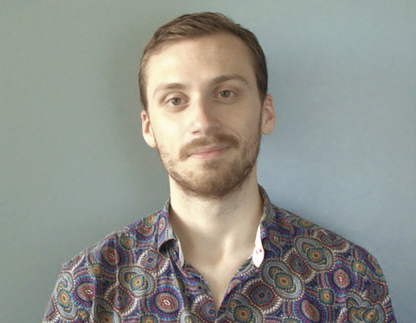The great thing about language is its omnipresence in human experience.”
Devin Johnson
PhD Candidate in the Department of Linguistics

Devin Johnson is a PhD candidate in the Department of Linguistics in the Weinberg College of Arts and Sciences, where he explores the miraculous process of human language comprehension. Devin’s research delves into the unconscious mechanisms that transform simple strings of characters into complex understanding, building and experimentally testing computational models to regarding these processes. Initially inspired by an interest AI, he now emphasizes the many differences between human language understanding and current machine learning capabilities. Devin is a Data Science Fellowship recipient, which supports graduate students dedicated to the exploration of fundamental and applied advancement in data science.
How would you describe your research and/or work to a non-academic audience?
My research is about how humans comprehend language. It's really something of a miracle that by you moving your eyes over what I type here, I can rely on you having some sort of understanding of what it is I intend. What's more is that this understanding arose involuntarily and within just a few seconds. What's underlying this? What are the unconscious processes that take a simple string of characters into that complex understanding in your head? What principles do these processes abide by? I try to answer these questions by building computational models of the mind and drawing predictions from them that I can then test in human experiments.
As a fun example, if I write, "John saw the man with a telescope," there's probably a scene that popped up in your head quickly and involuntarily. But how did your mind, among other things, quickly figure out who is holding the telescope (it could be John or the man). Most of the time when I ask this question, people certainly get one of the interpretations, but almost always miss the other one. Try thinking about how you even got to an interpretation, and then why it was one of them but not the other.
What have been some of the most memorable twists and turns of your career?
Machine learning and artificial intelligence (AI) were just starting to boom when I was finishing my undergraduate studies at UW-Madison. This inspired me to spend a lot of time studying various AI techniques for natural language processing in my master's program at University of Washington. By the time I got to my PhD here at Northwestern, the talk about ChatGPT and other Large Language Models (LLMs) was just about everywhere, and now the linguistics field finds itself in an interesting position: Suddenly, I am asked by undergraduate students and family members what linguistics has to offer at which AI is not already making better "progress."
In response, I like to remind them that convincing behavior or performance on language-y things does not mean the underlying systems are the same. It's just like how we don't believe birds and planes to be the same because planes “fly” in some sense of the word. One of my favorite examples to demonstrate this is the ELIZA chatbot program developed in the 60s. ELIZA almost always produces sensible responses to the user, but (I hope) no one would dare say that ELIZA "understands" or even processes language in the same way as humans.
This is because, when looking deeper, it is built purely with simple switches that trigger templated responses based on keywords. So, long story short, don't get caught up in the AI hype. Our understanding of "I" still has a long way to go.
What do you find both rewarding and challenging about your research and/or work?
The great thing about language is its omnipresence in human experience. Because of this, it's easily approached via so many methods of study, whether they be mathematical, computational, philosophical, artistic, etc. In my opinion, as someone who loves learning, this makes being a linguist immensely rewarding, as I can be constantly gaining inspiration from all sorts of areas. At the same time, this flexibility can also cause confusion, as there are so many voices of disagreement on how to do this thing we call linguistics, even for questions which can seem very basic. In the end, though, I think these disagreements are helpful for preventing the stagnation of ideas.
What books are on your bedside table?
Right now, it looks like:
- Sei personaggi in cerca d'autore by Luigi Pirandello
- Eating Animals by Jonathan Safran Foer
- 漫画禅の思想 (Zen Philosophy in Manga, Japanese Translation) by 蔡志忠 (Cai Zhizhong)
What inspires you?
Many things, but I think above all, knowledge and learning. I live for a well-crafted argument where the logical pieces fall together and the words flow smoothly for the listener. Even if I vehemently disagree with an idea, just the process of exploring it and arguing it for a moment is fun to me. I'm sure I'll be learning until the day I die.
Tell us about a current achievement or something you're working on that excites you.
I'm excited that I'm drafting my dissertation. It feels like time has flown by since I first started the PhD. Besides this, I'm happy to get my freelance translation and writing business more active. I've been in contact with many interesting people, and I love that I get to use all the various skills I've gained over the years in writing, teaching, science, math, linguistics, , and computer science.
Publish Date: July 23, 2024
If you know a graduate student, postdoctoral scholar, graduate faculty member, staff member, or a member of our TGS alumni population who would make a great candidate for our TGS Spotlight Series, please complete this brief TGS Spotlight Series Nomination Form.